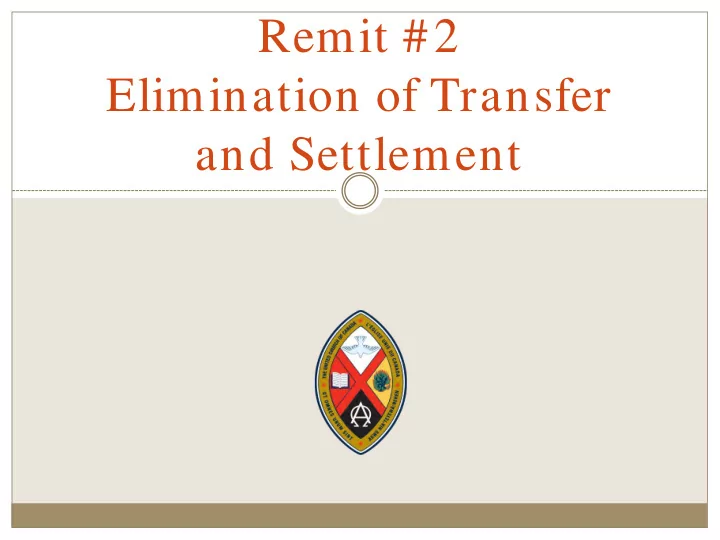

Remit #2 Elimination of Transfer and Settlement
What does “transfer” mean? “Transfer” is the process of moving members of • the order of ministry from one Conference to another for the purpose of settlement, or call and settlement. The transfer of membership between • Conferences is completed by the General Council Transfer Committee.
What does “settlement” mean? “Settlement” is the process of matching • members of the order of ministry with United Church pastoral charges that request settlement. Settlement also means ratifying calls made by • pastoral charges and presbyteries. The settlement of members of the order of • ministry is done by the Conference Settlement Committee.
Who is eligible? Only members of the order of ministry are • eligible for settlement and transfer. The “order of ministry” is made up of diaconal or • ordained ministers. The order of ministry does not include • designated lay ministers, candidates serving under appointment, diaconal supply, or ordained supply ministers.
Origin 40 th General Council 20 0 9 Transfer and settlement become optional for candidates for ordination and commissioning (before then, transfer and settlement were a condition of ordering). Since then After transfer and settlement became an option, fewer and fewer candidates have chosen to be settled.
Origin In 20 15 Only one minister and no candidates chose transfer and settlement; all others chose to search for their own call or appointment. Only two pastoral charges requested settlement in 2015. Currently A member of the order of ministry already serving in the church can request a new placement through transfer and settlement.
What is proposed (1) A community of faith seeking a minister conducts • a needs assessment and a search process. The vacancy is posted and made known. •
What is proposed (2) Candidates and members of the order of ministry • seeking a call may register their names on the church’s list of those available for call. They can use other tools offered by their • Conference for seeking ministry positions. They can send applications to specific ministries. •
What is proposed (3) The ministry receives applications for the • vacancy. In cooperation with the Conference/ Region, the • ministry interviews applicants and makes a decision to offer the call.
What are the implications? If rem it 2 passes… All ordained and diaconal ministers will seek • their own calls and local ministries will seek their ministers, in cooperation with the Conference. Settlement and Transfer committees will no • longer exist, meaning fewer volunteers will be needed. It may be more difficult for communities of faith • that have traditionally relied on this system, though fewer have been turning to it.
What are the implications? If rem it 2 passes… The presbytery no longer needs permission from • the Conference Settlement Committee to make appointments beyond the end of the pastoral year (June 30). The Settlement Committee will not have authority • to make a settlement in a pastoral charge with a vacancy declared by the presbytery which has failed to extend a call by the end of the pastoral year. (Basis 9.7)
What are the implications? If rem it 2 passes… The reporting from Settlement Committee to the • annual meeting of Conference about calls, settlements, transfers of 0rder of ministry from one Conference to another, and the placing of names of those left without settlement or presbytery appointment will not happen. Record will be in presbytery minutes and personnel files.
Do the presbytery and pastoral charges agree that… (a) the processes of transfer and settlement for members of the order of ministry within the United Church be eliminated, including the elimination of the General Council Transfer Committee; and that (b) the Basis of Union be amended to reflect this change?
What has been said…
Table Group discussion What did you hear as being gained (a positive)? What did you hear as being lost (a negative)? What would you lift up as your hope or concern?
Plenary discussion
Recommend
More recommend